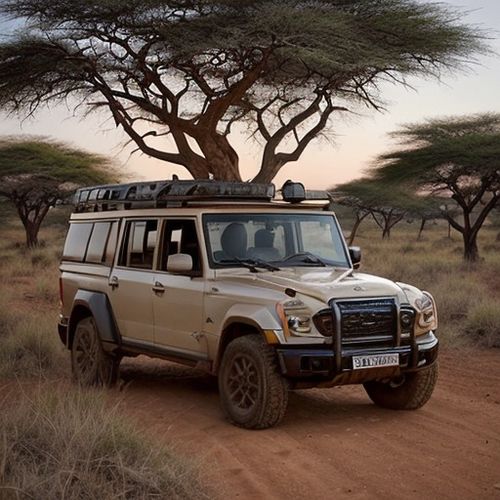The African safari experience has long been synonymous with raw adventure, untamed landscapes, and a deep connection to nature. But in a bold reimagining of luxury travel, a new wave of high-end camps is rewriting the rules by introducing an unexpected element: molecular gastronomy. This avant-garde culinary movement, once confined to Michelin-starred restaurants in global metropolises, is now taking root beneath acacia trees and starlit savanna skies.
At the forefront of this gastronomic revolution is Singita Kwitonda Lodge in Rwanda, where guests tracking mountain gorillas by day now indulge in deconstructed passion fruit soufflés by night. Executive Chef Dominique LeFevre, formerly of Paris's three-starred Le Cinq, has pioneered what he calls "bush-to-table molecular cuisine" - using liquid nitrogen to flash-freeze locally foraged berries and creating edible soil from toasted sorghum and volcanic ash. "The challenge," LeFevre explains while plating a dish resembling abstract art, "is maintaining scientific precision when hyenas might be prowling the kitchen perimeter."
Meanwhile in Botswana's Okavango Delta, andBeyond Xaranna Camp has constructed a fully-equipped molecular lab tent where guests can watch chefs spherify baobab juice into caviar-like pearls using sodium alginate. The camp's signature "Delta in Bloom" dessert - a frozen dome of mopane worm emulsion that cracks open to reveal marula gel - has become so popular that guests extend stays specifically for tasting menu nights. "We're not just feeding people," says Chef Amahle Dlamini, who trained at Barcelona's El Celler de Can Roca, "we're using food to tell the story of Botswana's ecosystems through texture and temperature play."
The logistical hurdles of bringing Michelin techniques to remote locations are staggering. At Kenya's Segera Retreat, a custom-designed solar-powered cryovac machine allows for sous-vide preparation of game meats without relying on unstable electricity grids. Helicopters transport liquid nitrogen canisters from Nairobi to the Maasai Mara weekly, while mobile cold chains preserve delicate foams and emulsions across bumpy dirt roads. "Our biggest innovation wasn't on the plate," reveals Segera's culinary director Marcus von Essen, "but in developing portable anti-gravity chambers to prevent mousses from collapsing during vehicle transfers."
Purists initially questioned whether molecular techniques belonged in wilderness settings, but the synthesis has proven magical. Tanzania's Greystoke Mahale serves chimp-shaped mango gelees that dissolve into spicy tamarind consommé when "groomed" with warm broth - a playful nod to the camp's habituated primates. In South Africa, Royal Malewane's "Bushveld Bubbles" experience pairs champagne with edible bubbles made from indigenous fynbos plants that burst with different flavors on the tongue. "This isn't about imposing European techniques," emphasizes Chef Lerato Mathabatha, "but using modern science to amplify Africa's ancient flavors in ways fire pits never could."
The economic ripple effects are profound. In Namibia, Hoanib Valley Camp now sources rare desert truffles from local San communities at premium prices, while Mozambique's Azura Benguerra employs marine biologists to identify new edible seaweed species for hydrocolloid experiments. Perhaps most remarkably, Rwanda's burgeoning specialty coffee scene owes much to baristas trained by visiting Michelin mixologists who pioneered coffee "airs" using safari camp espresso machines.
As the sun sets over Zambia's Time + Tide Chinzombo, guests gather at the "Bush Test Kitchen" where chefs demonstrate how to create leopard-print chocolate films using cocoa butter and activated charcoal. Nearby, a research team documents traditional Lozi cooking methods before they're lost - not for preservation, but for molecular reinterpretation. "We're witnessing the birth of an entirely new culinary genre," remarks food anthropologist Dr. Naledi Kgosi, who's studying the phenomenon. "Where else in the world do elephants trumpet outside while you eat foie gras that's been aged in termite mound chambers?"
This unexpected marriage of space-age cuisine and primal wilderness is redefining what luxury means in the safari context. No longer just about thread counts and wine cellars, the new African elite experience engages all five senses through food that tells ecological stories while challenging perceptions. As one diner at Kenya's Angama Mara put it while savoring a gin sphere that evaporated into juniper smoke: "I came for the Great Migration, but I'll remember the migrating flavors long after the wildebeest have crossed the river."

By Jessica Lee/May 20, 2025

By Victoria Gonzalez/May 20, 2025

By Christopher Harris/May 20, 2025

By Sophia Lewis/May 20, 2025

By Natalie Campbell/May 20, 2025

By Christopher Harris/May 20, 2025

By George Bailey/May 20, 2025

By Sarah Davis/May 20, 2025

By Daniel Scott/May 20, 2025

By Benjamin Evans/Apr 11, 2025

By Emily Johnson/Apr 11, 2025

By Sophia Lewis/Apr 11, 2025

By Emma Thompson/Apr 11, 2025

By Noah Bell/Apr 11, 2025

By James Moore/Apr 11, 2025

By Christopher Harris/Apr 11, 2025

By Christopher Harris/Apr 11, 2025

By Daniel Scott/Apr 11, 2025

By Grace Cox/Apr 11, 2025